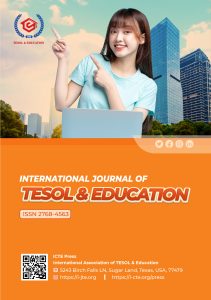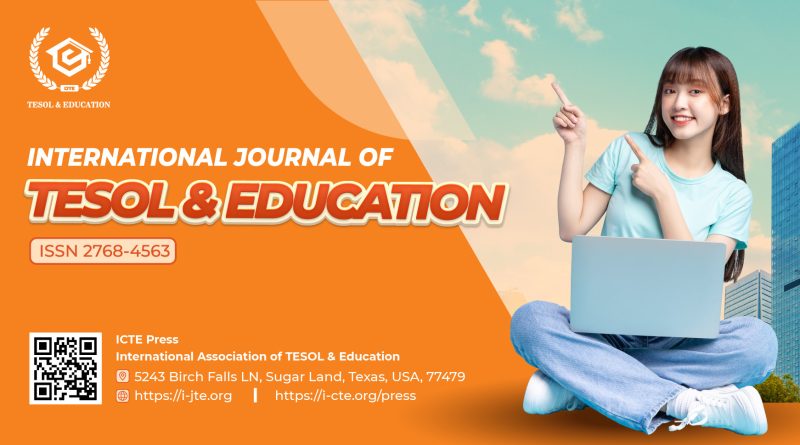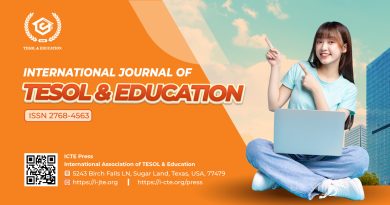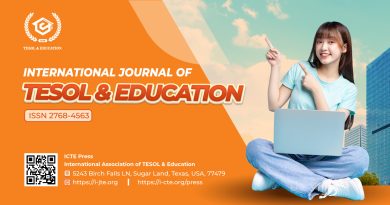Vol. 4 No. 2 (2024): TESOL & Education
Dear beloved TESOLers & Educators,
 Greetings and welcome to the latest edition of the International Journal of TESOL & Education, namely Volume 4, Number 2. This publication features a wide range of informative research papers and stimulating studies in the subject of Teaching English to Speakers of Other Languages (TESOL) and education. We take great pride in presenting the groundbreaking work of our writers, whose contributions have played a key role in developing our knowledge of language instruction and cultural studies.
Greetings and welcome to the latest edition of the International Journal of TESOL & Education, namely Volume 4, Number 2. This publication features a wide range of informative research papers and stimulating studies in the subject of Teaching English to Speakers of Other Languages (TESOL) and education. We take great pride in presenting the groundbreaking work of our writers, whose contributions have played a key role in developing our knowledge of language instruction and cultural studies.
Pham Ngoc Truong Linh’s research examines the cultural aspects found in store signage in American English and Vietnamese, highlighting notable cultural disparities and their potential impact on language instruction. The study highlights the necessity for more investigation into the influence of cultural disparities on consumer behavior and marketing tactics.
Dang Thi Minh Tam and Pham Thuy Quynh examine the correlation between course learning results and evaluations in Vietnamese linguistic programs, identifying areas that require enhancement. They propose conducting more research to examine the efficacy of different evaluation approaches in diverse educational settings.
Dang Thi Minh Tam and Tong Thi Mai Huong analyze the efficacy of instructional practices in English as a Foreign Language (EFL) classes at a university in Vietnam, offering practical suggestions for educators. Subsequent research endeavors might investigate the enduring effects of enhanced instructional communication on student academic achievement.
Amar Bahadur Sherma, Alok Lamsal, and Devi Prasad Pokharel analyze the notion of ecological citizenship as shown in the film “Avatar,” highlighting the need of environmental education. They propose more investigation on the influence of mainstream media on ecological consciousness and conduct.
Ly Cong Khanh analyzes the responsibilities of instructors in facilitating learner-centered language acquisition, providing valuable perspectives on successful instructional strategies. Further research should investigate the influence of various teacher training programs on the implementation of learner-centered methods.
Tran Thi My Linh examines how students see blended learning in English as a Foreign Language (EFL) courses and provides suggestions to improve the quality of their learning. Additional study is required to assess the scalability of blended learning models in various educational environments.
Pham Quynh Nhu and Pham Vu Phi Ho analyze the writing capabilities of third-year students and identify prevalent syntactic problems. They propose specific treatments to address these faults and enhance the students’ writing abilities. Further research might examine the underlying factors contributing to these mistakes and evaluate the efficacy of different instructional strategies.
Nguyen Kim Chi An and Le Hoang Dung examine the utilization of interrogative structures to enhance the correctness of English-speaking skills in learners, offering realistic teaching methodologies. Subsequent studies might prioritize exploring the implementation of these tactics in diverse language and cultural settings.
Nguyen Thi Thanh Van and Tran Thi Thanh Mai examine the utilization of TikTok by second-year students for English as a Foreign Language (EFL) speaking practice, emphasizing the advantages and difficulties it presents. Subsequent research might investigate the enduring consequences of utilizing social media platforms on the acquisition of language skills.
We extend our heartfelt gratitude to the writers for their steadfast dedication and outstanding contributions. We would like to extend our heartfelt appreciation to our editorial board for their unwavering support and guidance. We would like to extend our appreciation to the reviewers for their thorough and insightful feedback, which has been crucial in maintaining the outstanding standard of our journal.
We have confidence that you will find this subject to be academically engaging and inspiring. We highly value your engagement and contribution as we continuously strive for excellence in our field.
We want our esteemed readers to fully engage themselves in the captivating stories presented in this edition. These narratives will foster a vibrant exchange of ideas and promote innovation within the flourishing TESOL and education communities.
Thank you for your continuous support; we expect more innovative research in future issues.
Thanks be to God for everything!
Warm regards,
Associate Professor Dr. Pham Vu Phi Ho
Editor-in-chief
International Journal of TESOL & Education




